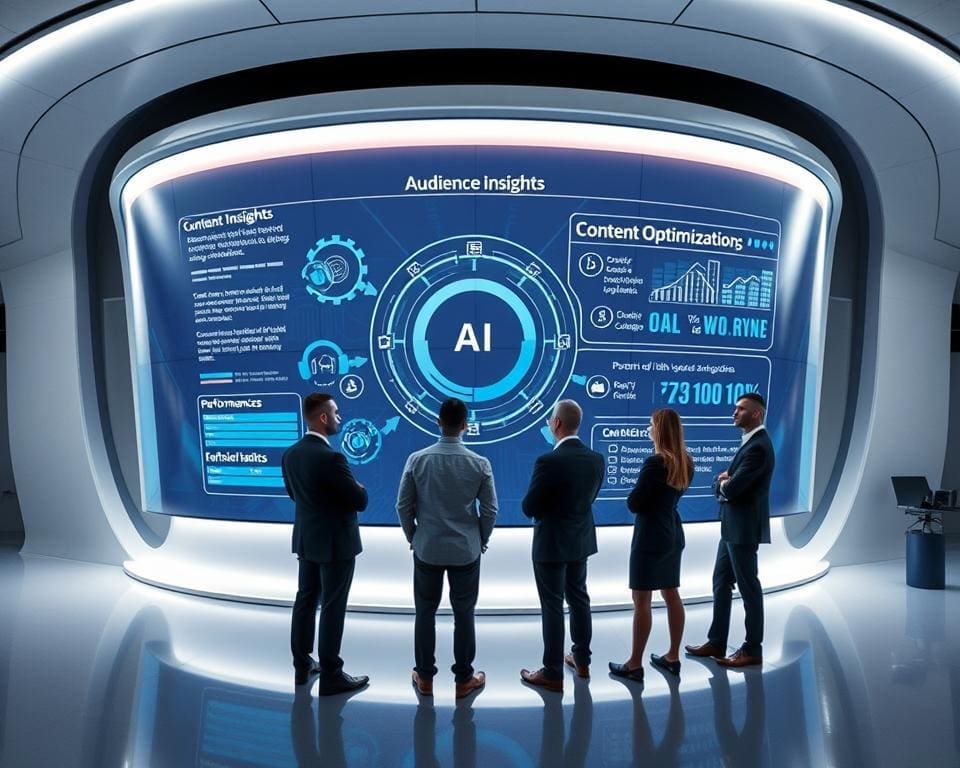As the digital landscape evolves, the question arises: can AI help plan your weekly content? In an age where content strategy is paramount, AI content planning offers a transformative approach to enhancing productivity and creativity. By incorporating advanced algorithms and machine learning, AI can streamline content automation, ensuring that marketers not only save time but also produce higher-quality content. This evolution in content planning not only boosts engagement but also optimises return on investment by aligning creative efforts more closely with audience preferences.
Understanding AI in Content Planning
In a rapidly evolving digital landscape, understanding AI in content planning becomes essential for marketers and content creators. This integration of artificial intelligence revolutionises how content strategies are formulated and executed, transforming traditional methodologies into sophisticated systems. The role of AI encompasses the analysis of vast data sets, enabling brands to tailor their content more effectively to audience interests.
What is AI Content Planning?
AI content planning involves the use of machine learning algorithms and natural language processing tools to enhance the efficiency of content creation. This technology allows for data-driven decisions, which significantly impacts the AI content strategy employed by brands. By analysing user behaviour and trends, AI can recommend topics, optimise posting schedules, and even automate content generation, streamlining the overall planning process.
The Evolution of Content Creation with AI
The shift from traditional content creation methods to AI-driven strategies marks a pivotal moment in digital marketing. Early content creators relied heavily on manual processes, often resulting in inefficiencies. With the advent of predictive analytics and advanced AI technologies, content production has transformed dramatically. Brands can now leverage insights gained from AI to guide their strategies, fostering not only speed but also enhanced relevance in content delivery.

Benefits of AI in Content Strategy
The integration of artificial intelligence in content strategy offers transformative advantages that no marketer can afford to overlook. By embracing automation, businesses can unlock a plethora of benefits that not only streamline processes but also enhance the relevance of their content. Understanding these advantages allows brands to tailor their approaches and optimise their content for maximum impact.
Efficiency and Time-saving through Automation
One of the remarkable benefits of AI in content strategy is the efficiency gained through automated content scheduling. This automation reduces manual effort, enabling marketers to allocate their time towards more strategic endeavours. Instead of focusing on logistical details, teams can channel their creativity and energy into crafting compelling narratives that resonate with audiences. Automation allows for a consistent flow of content, ensuring that brands stay relevant and engaged with their followers.
Enhanced Audience Insights and Engagement
AI excels in providing nuanced insights into audience behaviour. By analysing vast amounts of real-time data, brands can gain a deeper understanding of their target demographics. This capability enhances content strategies significantly. Custom-tailored content becomes possible, as AI identifies trends and preferences, maximising audience engagement. A data-driven approach leads to more personalised experiences, ultimately fostering stronger connections between brands and their audiences. The benefits of AI in content strategy extend well beyond mere efficiency, creating intrinsic value through engaged and loyal followers.
Can AI help plan your weekly content?
Optimising content delivery has become a pivotal aspect of effective marketing strategies. Understanding how AI can aid in this process provides brands with a significant edge. Predictive analytics plays a crucial role in shaping content schedules, allowing marketers to create a well-timed calendar that resonates with their audience.
The Role of Predictive Analytics in Content Scheduling
Predictive analytics utilises historical data trends to forecast the best times and types of content to publish. By analysing patterns in user behaviour, AI content creation tools can suggest optimal posting times, maximising audience engagement. Brands leveraging these insights can ensure their content reaches consumers when they are most receptive.
Several tools in the market harness predictive analytics to bolster content strategies. For instance, platforms like ContentCal and HubSpot offer advanced features that analyse audience interactions over time. This enables marketers to refine their content calendars dynamically, enhancing relevance and timing. As a result, businesses can expect to see increased engagement and improved content performance.
Utilising AI in this way facilitates a strategic approach to content planning, making it not only efficient but also highly effective in cultivating audience relationships. By embracing these technologies, brands can find themselves ahead of the curve in the competitive digital landscape.
Automated Content Scheduling Tools
In today’s fast-paced digital landscape, leveraging automated content scheduling tools can be a game changer for businesses. These AI tools for content automation not only enhance productivity but also streamline the entire content generation and scheduling process. By understanding the top available resources and how to integrate them into your workflow, organisations can reap significant benefits.
Top AI Tools for Content Automation
Various AI tools for content automation have emerged, each offering unique features to cater to different needs. Here are some of the most notable:
- HubSpot: Known for its marketing automation capabilities, it includes scheduling for social media, email marketing, and blogging, allowing for a cohesive content plan.
- Buffer: This user-friendly tool enables users to schedule posts across multiple social platforms swiftly. Its analytics help in refining strategies based on audience engagement metrics.
- Jarvis: This innovative text generation tool assists in creating high-quality written content, reducing the time spent on drafting and tweaking articles.
Integrating AI Tools into Your Workflow
Adopting automated content scheduling tools requires a thoughtful approach to integration. It is essential to address potential challenges and find practical solutions. Follow these steps to ensure a smooth transition:
- Assess your current workflow to identify areas where automated content scheduling tools can provide the most impact.
- Choose the right AI tools for content automation that align with your team’s goals and capabilities.
- Train your team to make the most of these tools, ensuring everyone understands their features and benefits.
- Regularly review and adjust your processes based on insights gathered from the tools to enhance ongoing performance.
Creating an AI Editorial Calendar
Utilising an AI editorial calendar can revolutionise your smart content planning approach. This tool not only streamlines your content creation process but also ensures alignment with your strategic objectives. To harness its full potential, follow this step-by-step guide on building an efficient editorial calendar with AI.
Step-by-step Guide to Building an Editorial Calendar with AI
Creating your AI editorial calendar involves several crucial steps:
- Define your goals: Identify what you aim to achieve with your content, whether it’s increasing engagement, boosting sales, or enhancing brand awareness.
- Choose the right AI tools: Research various AI tools suited to your needs, focusing on those that offer comprehensive features for content planning.
- Map out your content themes: Use AI analytics to determine trending topics in your industry and align them with audience interests.
- Schedule your content: Input your content ideas into the AI tool, which will optimise timing and frequency based on past performance and predictions.
- Review and adjust: Regularly update your calendar using analytics insights to adapt to audience preferences and seasonal changes.
Customising Your Calendar for Optimal Impact
Customisation is key in ensuring your AI editorial calendar remains relevant and impactful. Tailor your content formats, such as blog posts, videos, or infographics, based on what resonates with your audience. Integrate analytics tools to gain insights into how each content type performs and adjust your strategy accordingly.
By continually refining your AI editorial calendar, you can ensure that your smart content planning efforts yield consistent and effective results.
Developing an AI Content Strategy
Creating an effective AI content strategy involves aligning the innovative capabilities of artificial intelligence with your brand’s unique vision. The strategic integration of AI can significantly enhance content creation, delivery, and engagement levels.
Aligning AI with Your Brand’s Vision
Integrating AI into your content strategy requires a clear understanding of your brand’s goals and values. This alignment ensures that the AI technologies adopted truly resonate with your audience. Consider the following steps to achieve this:
- Define your brand’s core message: Ensure that the AI-generated content consistently reflects your brand’s identity.
- Identify audience needs: Tailor your content strategy to the interests and preferences of your target audience.
- Set clear objectives: Establish specific goals for your AI content strategy, such as increased engagement or audience growth.
Measuring Success: Metrics to Consider
Measuring success is crucial when implementing an AI content strategy. Utilising key performance indicators helps determine the effectiveness of your approach. Some metrics to consider include:
- Engagement rates: Monitor how well your audience interacts with your content.
- Audience growth: Track the increase in followers or subscribers to assess reach.
- Conversion rates: Measure actions taken by users based on your content, such as purchases or sign-ups.
Regular analysis of these metrics can provide valuable insights, facilitating adjustments to enhance the ongoing relevance and effectiveness of your AI content strategy.
AI Marketing Planning: The Future of Content
The landscape of AI marketing planning is evolving rapidly, driven by the need for businesses to adapt to consumer behaviour and preferences. Innovative trends such as AI-driven personalisation and real-time content optimisation are shaping the future of AI content marketing. These advancements enable brands to tailor their messaging and content strategy to meet the dynamic needs of their audiences, establishing deeper connections and enhancing engagement.
Innovative Trends Shaping AI Content Marketing
Several innovative trends are redefining how businesses approach content marketing. Personalisation has taken centre stage, with AI algorithms analysing user data to create bespoke content experiences. Real-time optimisation allows companies to adapt their strategies on the fly, resulting in content that resonates more effectively with target audiences. Another significant trend is predictive analytics, which provides insights into customer behaviour, enabling proactive adjustments in marketing campaigns.
Real-world Examples of Successful AI Implementation
Numerous companies have successfully implemented AI in their content strategies, proving its potential to revolutionise marketing efforts. For instance, Netflix employs sophisticated AI algorithms to analyse viewer preferences and behaviours, curating content recommendations that enhance user satisfaction. Similarly, Coca-Cola utilises AI tools to optimise its advertising campaigns, resulting in targeted messaging that resonates with consumers. Such examples highlight the concrete advantages of integrating AI into marketing strategies, illustrating how businesses can leverage these innovations for greater impact.
Challenges and Considerations in AI Content Creation
Embracing AI in content planning presents both opportunities and challenges in today’s digital landscape. One significant challenge in AI content creation lies in ensuring data privacy. As businesses collect vast amounts of user data for AI algorithms to deliver personalised experiences, maintaining compliance with regulations such as GDPR becomes paramount. Failure to navigate these complexities can lead to reputational damage and legal repercussions.
Accuracy in AI-generated insights also poses a concern. While AI can analyse data swiftly, the quality of its output heavily relies on the input it receives. Thus, the challenges in AI content creation often stem from poor data or misinterpretation of audience preferences. The risk here is the potential emergence of homogenised content that lacks the unique voice and personality of the brand, which may disengage audiences.
Ultimately, the most successful approach to AI content planning integrates advanced technology with human creativity. By recognising the importance of human oversight and intuition, brands can harness AI as a complementary tool rather than a replacement for human talent. This balanced strategy not only enhances creativity but also ensures that content retains its authenticity and resonates with the intended audience.









